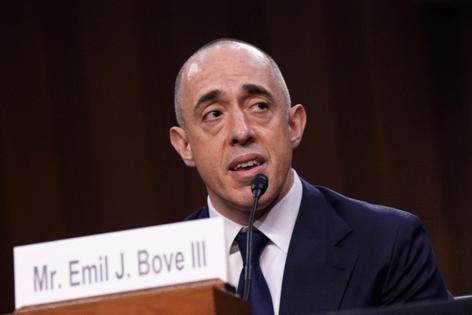Senate nears crucial vote on Trump judicial nominee
Published in News & Features
Senate Republicans are pushing to quickly confirm Emil Bove to a spot on a federal appellate court, as the president’s former defense attorney has emerged as the most contentious judicial nominee so far this Congress.
Bove’s bid for the U.S. Court of Appeals for the 3rd Circuit narrowly moved forward on a procedural motion this week, days after his nomination advanced in a tension-filled Senate Judiciary Committee meeting that featured a walkout from Democratic members.
A next-step procedural vote on Bove’s nomination could come as soon as Thursday.
Bove, a controversial figure in the Trump administration’s aggressive shake-up of the Justice Department, has drawn outrage from Democrats over accusations that he participated in an effort intended to undermine court rulings against the administration over deportation efforts.
During his time as a senior official the Justice Department this year, Bove played a role in the firing or reassignment of prosecutors involved in working on cases tied to the Jan. 6, 2021, attack on the U.S. Capitol. He also intervened in the department’s push to drop a public corruption case against New York City Mayor Eric Adams.
It remains to be seen whether his Justice Department tenure will sink his nomination. Senate GOP lawmakers hold a 53-seat majority in the chamber, but at least one Republican has signaled opposition to his appellate court bid.
Sen. Susan Collins, R-Maine, who is known to break with the party line on judicial nominees, said in a statement that the nation has to have “judges who will adhere to the rule of law and the Constitution and do so regardless of what their personal views may be.”
“Mr. Bove’s political profile and some of the actions he has taken in his leadership roles at the Department of Justice cause me to conclude he would not serve as an impartial jurist,” Collins said.
Another key vote could be Sen. Lisa Murkowski, R-Alaska, who voted this week against the procedural motion on Bove’s nomination.
Bove appears to be an outlier from the other judicial nominees President Donald Trump has put forward in his second term, said John P. Collins Jr., a law professor at George Washington University.
While many of Trump’s judicial nominees have documented bona fides in the conservative legal movement, Bove did not list himself as a member of the conservative Federalist Society, he said.
And because much of Bove’s legal career was divorced from politics, lawmakers do not have deep insight into where he stands on certain issues, Collins said.
“We don’t really know anything about his views on any hot-button legal issues the way we do know the views of a lot of these other folks,” he said.
Instead, the most logical conclusion is that the circuit court spot is a reward for Bove’s defense of Trump, and that he’ll show the same level of commitment to Trump while he’s on the bench, Collins said.
Democrats argue Bove has shown a staunch loyalty to Trump. They have also called attention to accusations from Erez Reuveni, a former Justice Department attorney who has alleged that the nominee was part of a plan to potentially defy court orders on deportations.
Senate Minority Leader Charles E. Schumer, in a floor speech Tuesday, characterized Bove as “hostile to the rule of law.”
“He’s not a jurist, but rather a Trumpian henchman,” the New York Democrat said. “His past shows he seeks not to be impartial, but rather to settle scores.”
Todd Blanche, the department’s deputy attorney general, defended Bove in a recent Fox News op-ed, saying the nominee has brought “rigor, integrity, and decency to his work.”
“He will decide cases fairly. He will apply the law as written,” wrote Blanche, another former Trump attorney.
Senate Judiciary Chairman Charles E. Grassley, R-Iowa, has characterized Bove as a qualified nominee and criticized “unfair rhetoric and treatment” from panel Democrats.
If confirmed, Bove would fill a spot on the U.S. Court of Appeals for the 3rd Circuit, a position left open by Democrats last Congress after the party was unable to garner enough support for then-nominee Adeel Mangi.
Mangi’s bid for the appellate court seat was one of the most intense judicial nomination fights last Congress, as conservatives sought to link him to anti-police activism, while Democrats said he was the target of a smear campaign.
Mangi, who would have been the first Muslim American to serve on a federal appeals court, faced improper attacks tied to his religion, they argued.
Despite signs in the spring of 2024 that Mangi would not have enough votes on the Democratic side, the White House stuck with his nomination.
Nevada Democratic Sens. Catherine Cortez Masto and Jacky Rosen both outlined that they did not plan on voting to confirm Mangi.
Cortez Masto, in an interview Tuesday, said the White House and her colleagues knew about her concerns on Mangi for months.
“My concern about Mangi was given to the administration, and my colleagues, in enough time to find a replacement or somebody else to fill that position,” Cortez Masto said.
Asked if the Biden administration should have moved more aggressively to fill the open 3rd Circuit seat, Sen. Richard J. Durbin, an Illinois Democrat who previously led the Senate Judiciary Committee, said they had a “good nominee”
“Unfortunately, he was caught up in a controversy not of his choosing,” Durbin said.
_____
©2025 CQ-Roll Call, Inc., All Rights Reserved. Visit cqrollcall.com. Distributed by Tribune Content Agency, LLC.







Comments